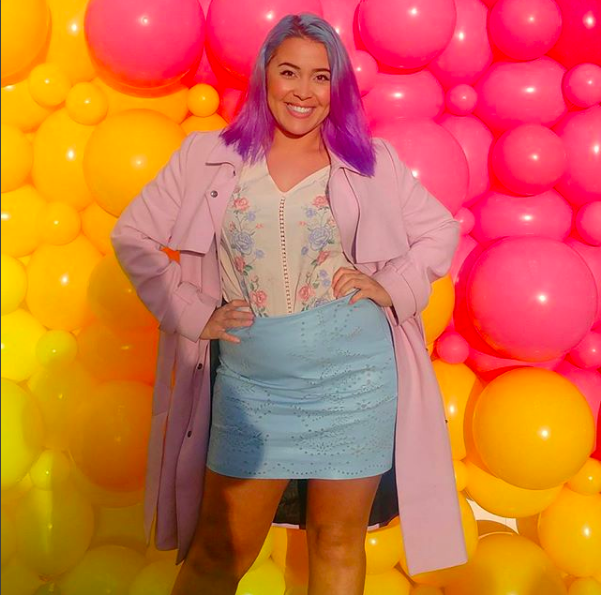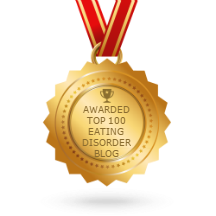- Home
- About
-
Services
- Therapy
-
Eating Disorder Trainings
>
- Clinical Approaches To Treating Body Image Issues
- Clinical Approaches To Treating Bulimia & Binge Eating Disorder
- Finding Freedom From Binge Eating
- Finding Freedom From Anorexia
- Supporting A Loved One With An Eating Disorder
- Eating Disorder Recovery Road Map
- Healing From Body Hate And Practicing Self-Compassion
- Common Questions
- Blog
- Press
- Contact
|
She is in recovery from an eating disorder. She’s no longer restricting, bingeing, or purging, and she is finally starting to feel free from this illness. She enjoys laughing with her friends over scones and coffee at Starbucks, and is no longer spending so much time fixated on food or her body. It begins subtly. She reads an article online about the benefits of ‘clean eating’ and ‘whole foods.’ She starts following ‘clean eating’ enthusiasts on Instagram, and spends time pouring over their pictures of perfectly styled acai bowls. She can’t believe how ‘unhealthy’ she was eating before and feels a sense of pride when checking out at the grocery store, with a cart filled to the brim full of ‘clean,’ organic, and ‘whole foods.’ The Problem With ‘Clean Eating’ In Recovery There’s a problem within the eating disorder recovery community, and I’m about to share a somewhat controversial opinion. I posted a status on Facebook that was highly shared and commented on. “Saying that you’ve recovered from an eating disorder and now you eat “clean” and stay away from processed foods-is like saying you are sober from alcoholism-yet maintain a “healthy” relationship to alcohol by sticking to wine and beer. While “clean eating” may be socially sanctioned-it’s incredibly dangerous for those in eating disorder recovery (and largely unhelpful to the population in general.)” This status was prompted by yet another interview featuring someone who claims to be in strong recovery from an eating disorder, who describes how she ‘eats clean’ and avoids all processed foods. 'Clean eating’ is largely unhelpful for the general population and can create a disordered or unhealthy relationship to food. However, it’s downright dangerous for those in eating disorder recovery. Here’s the thing: eating disorders are often sneaky illnesses. In recovery, they can try to subtly claw their way back into someone’s life. Think of an eating disorder as an abusive partner, who will say anything to try to get you back into their grasp. Research suggests that the best sustained recovery outcomes, occur when individuals are able to incorporate variety and flexibility into their eating patterns. Additionally, eating disorders thrive on rules, rigidity, and a sense of “good” vs. “bad” foods. Therefore, trying to ‘eat clean,’ and the idea that there are ‘unclean foods,’ which should be avoided-is incredibly triggering for those with the underlying genetics for an eating disorder. Anytime you apply rules or restriction to your eating patterns in recovery, there is a greater chance for the eating disorder to sneak back in. Of course, there are genuine exceptions, if you have been diagnosed by a doctor with celiac-for instance. However, largely the aim is to have flexibility, variety, and pleasure in your eating patterns. Further, there’s an emerging eating disorder called “orthorexia,” which is essentially an unhealthy fixation with ‘healthy eating.’ It’s easy to see how someone might transition from one eating disorder to another (more socially acceptable) presentation of an eating disorder. This can be difficult to recover from, as many may not even recognize that it is a problem. The Bottom Line I have so much empathy and compassion for how easy it is to fall into the ‘clean eating’ or ‘fitness’ trap while in recovery from anorexia, bulimia, OSFED, or binge eating disorder. In a culture where everyone is running around promoting juice cleanses, ‘detox’ diets, and ‘clean eating,’ it makes sense that this can happen. However, what’s important is that you recognize that this is typically another presentation of your eating disorder and it’s crucial that you reach out for treatment and support if you are struggling. Additionally, it’s important to note that food and morality have nothing to do with each other. Carrots aren’t wearing angel halos and cake isn’t diabolically plotting to harm you. All foods can fit into a healthy diet, and can be enjoyed guilt-free. Because you never need to feel guilty for eating, unless you stole that brownie from the store. Guilt free foods=all foods. Further, if the goal of ‘clean eating’ is purported to be health, it is important that we recognize that good mental health is a crucial part of a healthy lifestyle. I think we can all agree that obsessively following food rules, being unable to eat a meal out with friends, and feeling ashamed after eating a brownie is not mentally healthy. Especially if you are in recovery from or have a history of an eating disorder, there is simply no way to ‘eat clean,’ quit sugar, avoid processed foods, go on a diet (even if you call it a lifestyle change!), and strongly maintain your recovery. It’s paradoxical. It’s like, saying “let me heal from my mental illness that causes me to obsess and focus on food and my body-by finding a new way to obsess and focus on food and my body.” Ultimately, you deserve to be truly free from food rules, obsession, and body-hate. Jennifer Rollin, MSW, LCSW-C: is an eating disorder therapist in private practice in Rockville, Maryland. Jennifer specializes in helping teens and adults struggling with anorexia, binge eating disorder, and bulimia, and body image issues. Jennifer provides eating disorder therapy in Rockville, MD, easily accessible to individuals in Potomac, North Potomac, Bethesda, Olney, Germantown, and Washington D.C. Connect with Jennifer through her website: www.jenniferrollin.com Check out Jennifer's on-demand eating disorder trainings here!
9 Comments
I am so thrilled to have gotten to interview the amazing Megan Crabbe, who runs the awesome body-positive Instagram account, Bodyposipanda, and is the author of Body Positive Power, which is available for pre-order here. I've had so many clients share that Megan's Instagram account was incredibly helpful for them in their recovery. She is a true inspiration to so many and a living example that recovery is possible. Jennifer: Tell me a little bit about your struggle with an eating disorder (please avoid numbers of graphic descriptions of behaviors, so as not to trigger my readers)/ Megan: I've had a disordered relationship with food since I was a child. It was around 10 years old that the dieting and calorie counting started, and from there spiraled into a diagnosis of anorexia nervosa at 14. It took me two years to claw my way out of anorexia - and end up right back at the cycle of restriction and binge eating that had lead me there in the first place. It wasn't until I found body positivity at 21 years old that I finally began a true recovery from disordered eating, left dieting behind and truly healed. Jennifer: What do you think was the function of your eating disorder in your life? Megan: Wow, this is a fantastic question. For me, food, exercise and the numbers they add up to were always things that I could put my anxiety into. They were vehicles for my pain, and I believed at the time that they made that pain easier to manage. If you take all of your feelings of inadequacy, of never being good enough, of feeling like you can't keep hold of your life, and channel them into a calorie count, you feel like you've regained some semblance of control. You have something tangible that promises to make everything better, something that you feel you have total power over even if everything else is making you feel powerless. The numbers gave me something to hold onto, and I held on so tight, that I never stopped to realize they were also destroying me. Jennifer: Was there a turning point for you, where you really started to embrace the idea of recovery? Megan: I always say that my major turning point was seeing my dad cry for the first time in my life. It's a strange thing when you're that deep in the anorexia mindset, most of your thinking is entirely distorted by the eating disordered part of your brain, but every so often you get these sharp flashes of reality. Moments when you realise the magnitude of what you've done, or what the eating disorder has done to you. 9/10 times the eating disorder will overpower those glimpses of reality and convince you they're false, the turning point comes when a glimpse of reality is bright enough to break through, overpower the ED voice, and remind you that there is a real life out there worth fighting for. Not wanting to ever see the people I love in that much pain again was a bright enough flash for me to start the fight. Jennifer: What helped you get through the tough times in recovery? Megan: My dad. He was basically my therapist, my biggest cheerleader, my shoulder to cry on. I'm incredibly blessed to have had someone in my life who was never willing to give up on me, even when he was told that he probably should. Jennifer: What were some of your motivations in terms of pushing yourself in recovery? Megan: Anger was my biggest motivator. Anger towards my eating disorder for taking so much of my life from me and hurting everyone around me. It was anger that fueled the first bite of food and anger that pushed me to take every bite after that. I rose up and fucking refused to spend another day of my life listening to that voice because all it had ever done was destroy everything it got hold of. And I genuinely believe that every single person reading this who's struggling right now has that anger inside them as well. We have so much more power than we realise. Jennifer: What was the most helpful for you in terms of your recovery (i.e. specific skills, tools, treatment etc)? Megan: My actual treatment was kind of a shambles, this was 10 years ago and NHS (UK) mental health services were even worse than they are now. I relied massively on the support of my family, and further down the road, of my friends. One of the most helpful things for me was spending time with people who loved food. Who had never had a disordered relationship with it, who felt no shame in ordering dessert or having a second helping if they wanted it. My friend Sian became my after school snack time buddy and simply being around someone who enjoyed food unapologetically, didn't care about calories and was for most part comfortable in her own skin, was exactly what I needed at that time. Jennifer: How is your life in recovery (or recovered) different from your life in an eating disorder? What would you say are some of the benefits of being recovered? Megan: My life now is a life that I never believed I would get to live. It's a life where I'm mentally free enough to focus on all of the parts of myself that I never knew were there because they were obscured by the numbers. It's a life where I can thrive and grow and explore and find joy in the world because shrinking my body is no longer on my list of priorities. It's a life where I barely even think about food until my stomach tells me that I'm hungry, then I enjoy it, no longer even think about the numbers, and go about my day. It's living. The kind of living that staying trapped in my eating disorder never would have allowed me. Jennifer: What are some of your favorite recovery resources? (i.e. books, articles, podcasts, etc). Megan: Some books that were real game-changers for me are The Beauty Myth by Naomi Wolf, Fat! So? by Marilyn Wann, Losing It by Laura Fraser, and there are so many more. Online some of my favorite recovery and body positive accounts are @iamdaniadrianna @gracefvictory @dothehotpants @the_feeding_of_the_fox and @scarrednotscared Jennifer Rollin, MSW, LCSW-C: is an eating disorder therapist in private practice in Rockville, Maryland. Jennifer specializes in helping teens and adults struggling with anorexia, binge eating disorder, and bulimia, and body image issues. Jennifer provides eating disorder therapy in Rockville, MD, easily accessible to individuals in Potomac, North Potomac, Bethesda, Olney, Germantown, and Washington D.C. Connect with Jennifer through her website: www.jenniferrollin.com Check out Jennifer's on-demand eating disorder trainings here! I’m in the check-out line at Nordstrom Rack, when a 13-year-old boy points at a snack by the register and says, “look mom that has X many calories, in that little package! It's way too much.” As an eating disorder therapist, it took everything in me not to turn around and say, “calories are units of energy that help you live your life, not something that you need to fear.” However, by the time I had contemplated this in my head, they had already moved onto another topic of conversation. Diet-talk, fat-phobia, and comments about weight/weight-loss, unfortunately is rampant in our culture. However, like fish who have gotten used to swimming in polluted water-these kinds of topics and comments are seen as culturally normative. As a society, we’ve been conditioned to believe that fat=bad, that thin=good, and that calories (as well as certain foods) are the enemy. We’ve been sold these lies because they fuel multi-billion dollar industries, including the diet industry and the medical “weight loss” industry. If we believed that we were enough, just as we are-then we wouldn’t flock to purchase the latest diet products, expensive juice cleanses, and medical procedures. Recovering from an Eating Disorder in A Disordered Culture Eating disorders are life-threatening mental illnesses, whose symptoms often manifest in a preoccupation with food and weight. Recovering from an eating disorder in the midst of this disordered culture that we live in, can be tough. However, it is 100% possible. The following are a few quick tips for how to cope when you are feeling triggered: 1. Notice the thoughts and feelings that are coming up for you, without judgement. Practice, simply noticing any eating disorder thoughts, as well as any feelings that come up for you in response to the trigger. Instead of judging the thought, try to be curious about it. 2. Respond from your “healthy self.” Think about what you’d say to a friend, a small child, or a loved one who said exactly what you just told yourself. This concept comes from Carolyn Costin, a prominent eating disorder therapist and founder of Monte Nido. I love having clients practice writing out dialogues between their “eating disorder self,” and their “healthy self.” Often, I will have them role-play this with me in session, as well. An Example: Eating disorder self: You can’t eat that pizza, it’s so bad for you. You don't deserve to eat it. Healthy self: I always deserve to nourish myself with food that I enjoy. Food isn’t good or bad. All foods can fit in a healthy diet. 3. Recognize that any comments are really a reflection of the other person. People who are making lots of comments about food and weight, are simply demonstrating where their own focus lies. Try to recognize that any food or weight related comments are really just a reflection of the other person, and have little to do with you. If you can, try to practice imagining yourself sending some compassion to the other person, because they are still steeped in diet-culture and fat-phobia. It’s such a waste of precious brain space, and it truly is sad to see someone who is so immersed in this. There are so many better uses of time, energy, and money. 4. Set some healthy boundaries. I was talking to a wise woman the other day (shout out to Nicole Mcdermid) about how setting boundaries can actually be an act of compassion-both for you and the other person. If we don’t set healthy boundaries, often we can grow resentful and this can negatively impact the relationship. If someone is going on about their latest diet or weight loss it’s perfectly appropriate to change the subject, make an excuse to leave the room, or say “so what else is going on in your life? I know there’s a lot more to you, than your new diet!” If you feel comfortable, you could also share that you are in recovery from an eating disorder and find this kind of talk to be triggering. You deserve to set boundaries for your own self-care. Also, in modeling that these topics are unhelpful-you might be planting a seed for someone else who is stuck in a disordered mentality. Practice Self-Compassion Eating disorder recovery is hard work. Additionally, recovering from an eating disorder when everyone is running around talking about their latest juice cleanse (shout out to my liver and kidneys for rendering any kind of “cleanse” totally unnecessary), or weight-loss attempt, can be tough. It’s so important to be compassionate with yourself, if you are finding that you are triggered by comments that others are making. If you can, work to surround yourself with positive people both in person and online. While it's important to learn how to cope with triggers in the environment, you can also do your best to surround yourself with a "pro recovery bubble." Recovery is hard work, and it will be so worth it. Jennifer Rollin, MSW, LCSW-C: is an eating disorder therapist in private practice in Rockville, Maryland. Jennifer specializes in helping teens and adults struggling with anorexia, binge eating disorder, and bulimia, and body image issues. Jennifer provides eating disorder therapy in Rockville, MD, easily accessible to individuals in Potomac, North Potomac, Bethesda, Olney, Germantown, and Washington D.C. Connect with Jennifer through her website: www.jenniferrollin.com Check out Jennifer's on-demand eating disorder trainings here! Helping clients to develop insight into the cause of their eating disorder is great. However, it’s not enough when it comes to truly helping people to recover from eating disorders. Unfortunately, I still see therapists whose primary treatment approach for helping those with eating disorders is psychodynamic psychotherapy. Psychodynamic therapy is an insight-oriented therapy that focuses on helping a client to understand the influence of the past on present behavior. Now, I’m certainly not saying that psychodynamic therapy is “bad,” or that it’s not important to explore with clients the influences of their past in terms of the eating disorder. The problem is that when you stop there, or when your entire focus of treatment is to understand “why” someone is turning to their eating disorder behaviors-it’s going to be really hard for someone to recover. While it’s interesting and can sometimes be helpful in terms of having a broader understanding, you don’t actually need to know “why” someone developed their eating disorder in order to successfully treat them. It’s kind of like if someone went to a doctor with a broken arm. You don’t actually need to know why they broke their arm, in order to put it in a cast and proceed with the necessary treatment. The Importance of Setting Behavioral Goals As a therapist, I tailor treatment to each client. I use a blend of treatment that includes elements of cognitive behavioral therapy (CBT), dialectical behavioral therapy (DBT), and acceptance and commitment therapy (ACT), and sometimes FBT-informed. I could write a whole book on the key elements of eating disorder treatment, as there are many and treatment is multifaceted. However, today I want to focus on the importance of setting behavioral goals and really “getting into it,” when it comes to the client’s behaviors, thoughts, and feelings around food and their body. Eating disorders are about the food and they also aren’t about the food. We need to address the disordered behaviors and unhelpful thoughts around food, exercise, and weight-and also look at the functions that these behaviors are currently serving in the person’s life. Setting specific goals that challenge the client’s eating disorder behaviors is so important, and needs to be incorporated into treatment. It’s kind of like if someone had a phobia of driving. We could sit in therapy and talk about where their fear stemmed from, but until we actually set goals around getting in the car-it’s unlikely that the person will be able to get better. Goal Setting Around Eating Disorder Thoughts/Behaviors For homework, I typically assign my clients to list out all of their specific eating disorder behaviors, that way we can gradually start to challenge them-in a way that feels uncomfortable but not unsafe. The same way that I wouldn’t take someone with a phobia of driving and put them right onto the highway, we often start by addressing the lower level sources of anxiety and then working our way up. Another element of treatment that can be helpful, is eating with clients. I’ve gotten a lot of questions about how I incorporate this into my treatment approach. Some clients really benefit from directly challenging their food rules/fears in session. Right now, I do lunch with clients about 4-5 times a week and I also will sometimes do “challenge snacks” with clients in session. Also, if a client comes in and has not eaten very much, it’s unlikely that our session will be very effective when their brain is so malnourished. So, I always have a few drawers of snacks on-hand in my office. I also will set goals with clients (and practice in session) around speaking back to their “eating disorder self” from their “healthy self,” which I’ve found to be so incredibly helpful for many clients. What Are You Working Towards? If you don’t set goals or have a vision for what you want to life to look like when you are recovered, it’s going to be harder to work towards this. That’s why it’s so crucial to have a therapist and registered dietitian who are actively setting goals with you and helping you to envision what you are actually working towards. My approach to therapy is compassionate, yet firm. I am empathetic and understanding and I also set goals with clients and hold them accountable. As clients are making progress in their recovery, we can also start to explore the function of the behaviors in their life. Often eating disorder behaviors are a way that someone is trying to regulate uncomfortable emotions, cope with past-trauma, or deal with feelings of low self-worth. Through therapy, clients can learn healthier ways to cope with intense emotions, and we also can look at strategies for addressing the underlying issues. However, we need to be doing this in tandem (or often after) addressing the specific eating disorder thoughts and behaviors. If you are struggling with an eating disorder, please seek help. Seeking treatment is a sign of true courage, not weakness. Make sure that you are setting goals for your recovery and that your treatment team is holding you accountable. If your therapist is not setting goals with you, give them feedback or look for someone who can better support you in your recovery. Often big changes happen-one small goal at a time. Jennifer Rollin, MSW, LCSW-C: is an eating disorder therapist in private practice in Rockville, Maryland. Jennifer specializes in helping teens and adults struggling with anorexia, binge eating disorder, and bulimia, and body image issues. Jennifer provides eating disorder therapy in Rockville, MD, easily accessible to individuals in Potomac, North Potomac, Bethesda, Olney, Germantown, and Washington D.C. Connect with Jennifer through her website: www.jenniferrollin.com Check out Jennifer's on-demand eating disorder trainings here! Sometimes people who are struggling with eating disorders have the idea that they will wait until their feel “ready” to fully commit to recovery. Or that there will be a moment of magical clarity, where suddenly they are highly motivated to recover and the process feels easier. Some people do hit a point of high motivation in terms of recovery, however the problem is that if everyone waited until they felt “ready” to recover-many would die waiting. In general, people may avoid taking risks in life because they think that they need to wait until they feel “ready” or confident enough to do so. However, the paradox of this is that you will only begin to feel less afraid and gain confidence by gradually exposing yourself to what you are afraid of Susan Jeffers, Ph.D., exemplified this in her book entitled "Feel The Fear... And Do it Anyway" when she stated: "I had grown up waiting for the fear to go away before I took any chances. When I am no longer afraid... then! For most of my life I had played the when/then game and it never worked... Fear of particular situations dissolved when I finally confronted them. The doing it comes before the fear goes away." This is why it's so important to "feel afraid," and take action anyway-that is alignment with your true values. Start Before You “Feel Ready” You don’t need to feel “ready” in order to recover from an eating disorder. How do I know this? I’ve had clients (both teens and adults) who were pretty much forced into therapy by parents, spouses, or other concerned individuals in their life-who are now in strong recovery or recovered. It makes perfect sense that there may be part of you which desperately wants to cling onto the eating disorder. It’s likely that the eating disorder is serving some functions in your life right now. Also, often for people who are struggling, their eating disorder feels like a “safe” and “comfortable,” place to stay-even when it’s evident to everyone around them that it’s negatively impacting their life. Willingness vs. Willfulness In dialectical behavioral therapy, they talk about the concept of willingness vs. willfulness. I don’t need a client to feel “ready” to recover, there just has to be some element of willingness. Even if the willingness simply comes from someone else forcing them into therapy. Or it's the willingness to take their best shot at recovery, because living with the eating disorder feels exhausting. This is my favorite description of the concept: “Life is a lot like being a batter in front of a pitching machine. So what happens when you're in front of a pitching machine? There's a machine and it's throwing balls at you. And you're standing at one end and the machine is at the other and the balls start coming. You've got a bat. Now, if the balls coming at you and the pitching machine is throwing them, what are your options? Well, you could either take your bat, pull it back, try to hit the ball. Or, you could throw a tantrum. You could get really upset. You could say, 'It's coming too fast. I don't like it. I'm not doing it. I'm not hitting that ball anymore. Stop.' You think the balls would stop coming if you did that? No. Life is like that. You can get as upset as you want about life but actually life just keeps coming - one moment right after the next. What are your options? You can stand there, do nothing, let the ball go by. Or, you could stand in front of the ball and just get hit by it. Or, you could try to hit the ball. Willingness is trying to hit the ball.” You’re eating disorder is essentially keeping you in a cage. I’m asking you to commit to being “willing” to do whatever it takes to step outside of the cage (even if right now you can only commit to a short period of time). You can always decide to step back into the cage, if you find that you don’t enjoy your life in recovery-but I haven’t met anyone who is recovered who wants to go back to the eating disorder. What Are You Willing to Commit To? I know that surrendering is scary, and it’s also a sign of true courage. I’d encourage you to ask yourself, if I truly embrace “willingness” and “surrendering” to the recovery process, what steps could I take on a daily or weekly basis? Ask your treatment team to help hold you accountable. If you don’t have a team, it’s so important to reach out for help and support. Please don’t wait until you feel “ready” or “deserving” of treatment. You deserve a meaningful and joyful life. One that you cannot fully have if you continue to stay trapped in your eating disorder. Take the first step. It will be worth it. Jennifer Rollin, MSW, LCSW-C: is an eating disorder therapist in private practice in Rockville, Maryland. Jennifer specializes in helping teens and adults struggling with anorexia, binge eating disorder, and bulimia, and body image issues. Jennifer provides eating disorder therapy in Rockville, MD, easily accessible to individuals in Potomac, North Potomac, Bethesda, Olney, Germantown, and Washington D.C. Connect with Jennifer through her website: www.jenniferrollin.com Check out Jennifer's on-demand eating disorder trainings here! |
About MeI'm an eating disorder therapist in private practice in Rockville, MD. Archives
June 2024
|






 RSS Feed
RSS Feed
